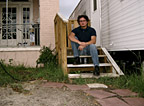July 14, 2006
Faculty member, student study hurricane recovery
CARBONDALE, Ill. -- Hurricane Katrina was the costliest and most destructive storm to hit the United States. Nearly a year later, the struggles of Gulf Coast residents continue and among the many people assisting in recovery efforts are an anthropology professor and his student from Southern Illinois University Carbondale.
Roberto E. Barrios is a new SIUC faculty member whose work focuses on the aftermath of disasters such as hurricanes. Since early June, Barrios has been living in a Federal Emergency Management Agency trailer in the Versailles neighborhood on the east side of New Orleans, which is a largely Vietnamese community. He is recording the sociopolitical relations between government agencies and displaced residents.
"I am interested in the policies being devised for recovery efforts and the impact on the people it supposedly speaks for," Barrios said. "The premise I'm working on is that when a policy is created, it inevitably has to assume things about people and societies. My research has shown those assumptions are often incorrect and that causes social crises."
Eric Dangoy, an SIUC graduate student in anthropology, joined Barrios for two weeks in June. He attended protests staged by community residents and interviewed city council members working on the reconstruction process.
"It was a great opportunity to see the city of New Orleans and to see the effects of the disaster and reconstruction efforts first hand," said Dangoy, a native of Chicago Heights.
SIUC Chancellor Walter V. Wendler's Reflective, Responsive University Initiative sponsored Dangoy's trip. Seymour Bryson, associate chancellor for diversity on campus, coordinates those grants.
Dangoy said he came away from the project with a greater sense of self and a tremendous amount of respect for his professor. "I better learned the methods of field work. I learned about the advantages and the frustrations of making your way into a community in order to do effective research."
Barrios will stay in New Orleans until the end of July and then present a paper on his findings. So far, he finds his discoveries disheartening.
"Recovery is slow, disorganized and filled with frustration for residents," he said. "Families and business owners are going about reconstruction on their own and the local governments are tying their own hands around their own bureaucratic policies."
Barrios has devoted his career to studying the post-disaster challenges facing affected communities. He received a Fulbright Fellowship in 2000 to report on the nutritional status of children in Honduras after Hurricane Mitch devastated the region.
The professor said he has a passion for the work.
"I was born in Guatemala and when I was 13 years old, my family was displaced when we immigrated to this country," he said. "Now I am interested in the issues of forced migration, displacement and re-settlement. The answer is to give neighborhood associations veto power over policies made by larger government agencies."
Barrios hopes his work helps government agencies better respond to disasters.
Barrios earned a doctorate in medical anthropology and a master's degree in applied anthropology from the University of Florida. He received his bachelor's degree in anthropology from the University of New Orleans.
Recruiting high-quality faculty and students are among the goals of Southern at 150: Building Excellence Through Commitment, the blueprint for the development of the University by the time it celebrates its 150th anniversary in 2019.

